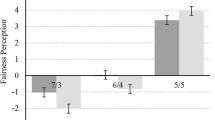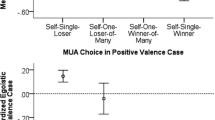Abstract
Drawing on multidisciplinary findings and ideas, I discuss in this paper fair allocation of social resources, such as goods, services, and information. It is held that the allocation event, featuring actor, recipient, and observer, as well as the social resources to be allocated by an actor, can function as a guideline for the essentials of fair behavior. The role of the essential features of allocation behavior: motivation, cognition, and emotion, as well as morality and reactions to perceived unfairness are examined. I give explanations as to why, how, and to what extent, people, in an effort to attain justice, allocate social resources between self and others and among others. I explore the conditions under which an actor may deviate from a just division of social resources, thus, instigating a reaction from recipients and observers.
Similar content being viewed by others
Notes
Love is an expression of affectionate regard, warmth, or comfort. Status indicates an evaluative judgment that conveys prestige, regard, or esteem. Services involve activities that affect the body or belongings of a person and that often constitute labor for another. Information includes advice, opinions, instruction, or enlightenment but excludes those behaviors that could be classified as love or status. Money is any coin, currency, or token that has some standard unit of exchange value. Goods are tangible products, objects, or materials.
References
Acemoglu, D., & Robinson, J. (2012). Why nations fail: The origins of power, prosperity and poverty. New York: Crown Publishers.
Ambrose, M. L., & Arnaud, A. (2005). Are procedural justice and distributive justice conceptually different? In J. Greenberg & J. A. Colquitt (Eds.), Handbook of organizational justice (pp. 59–84). Mahwah, NJ: LEA.
Barber, B. (2013). If mayors ruled the world: Dysfunctional nations, rising cities. New Haven: Yale University Press.
Bies, R. J., & Moag, J. S. (1986). Interactional justice: Communication criteria of fairness. In R. J. Lewecki, B. H. Sheppard, & M. H. Bazerman (Eds.), Research on negotiations in organizations (pp. 43–55). Greenwich, CT: JAI Press.
Bies, R. J., & Shapiro, D. L. (1988). Voice and justification: Their influence on procedural justice judgments. Academy of Management Journal, 31(3), 676–685.
Chadwick, R.A., & Trafimov, D. (2005). Reasons in Social Reasoning: The Effect of justification on trait attribution for immoral behavior (in preparation).
Clayton, S. (2000). Models of justice in the environmental debate. Journal of Social Issues, 56(3), 459–474.
Darley, J., & Batson, C. (1973). From Jerusalem to Jericho: A study of situational and dispositional variables in helping behavior. Journal of Personality and Social Psychology, 27, 100–118.
Elias, N. (1969). Über den Prozess der Zivilisation. Soziogenetische und Psychogenetische Untersuchungen. Bern: Francke Verlag.
Feinberg, M., & Willer, R. (2011). Apocalypse soon? Dire messages reduce belief in global warming by contradicting just world beliefs. Psychological Science, 22, 34–38.
Feinberg, M., & Willer, R. (2013). The moral roots of environmental attitudes. Psychological Science, 24, 56–62.
Foa, U. G., & Foa, E. B. (1974). Societal structures of the mind. Springfield, ILL: Charles C. Thomas Publisher.
Folger, R. (1977). Distributive and procedural justice: Combined impact of ‘voice’ and improvement on experienced inequity. Journal of Personality and Social Psychology, 35, 108–119.
Haidt, J., & Joseph, C. (2007). The moral mind: How five sets of innate intuitions guide the development of many culture-specific virtues, and perhaps even modules. In P. Carruthers, S. Lawrence, & S. Stich (Eds.), The innate mind (pp. 367–392). Oxford, UK: Oxford University Press.
Jost, J. T., Banaji, M. R., & Nosek, B. A. (2004). A decade of system justification theory: Accumulated evidence of conscious and unconscious bolstering of the status quo. Political Psychology, 25, 881–919.
Kameda, T., Takezawa, M., & Hastie, R. (2003). The logic of social sharing: An evolutionary game analysis of adaptive norm development. Personality and Social Psychology Review, 7(1), 2–19.
Leventhal, G. S. (1980). What should be done with equity theory? New approaches to the study of fairness in social relationships. In K. J. Gergen, M. S. Greenberg, & R. H. Willis (Eds.), Social exchange. Advances in theory and research (pp. 27–55). New York: Plenum Press.
Moll, J., Zahn, R., de Oliveira-Souza, R., Krueger, F., & Grafman, J. (2005). The neural basis of human moral cognition. Nature Reviews Neuroscience, 6, 799–809.
Müller, M., & Clayton, S. (2013). Introduction to “Environmental Justice”. Social Justice Research, 26(3), 227–230.
Paavola, J., & Adger, W. N. (2006). Fair adaptation to climate change. Ecological Economics, 56(4), 594–609.
Piketty, Th. (2014). Capital in the twenty-first century. Boston: Harvard University Press.
Rawls, J. (1971). A theory of justice. London: Oxford University Press.
Rousseau, J.-J. (1992). Discourse on the origin of inequality. (D. A. Cress, Trans.). introduced by James. Indianapolis: Hackett Pub.Co.
Skitka, L. J., & Houston, D. (2001). When due process is of no consequence: Moral mandates and presumed defendant guilt or innocence. Social Justice research, 14, 305–326.
Sole, K., Marton, J., & Hornstein, H. A. (1975). Opinion similarity and helping: Three field experiments investigating the bases of promotive tension. Journal of Experimental Social Psychology, 11, 1–13.
Stiglitz, J. E. (2013). The prize of inequality: How todays divided society endangers our future. New York: Norton & Company.
Tajfel, H., Billig, M., Bundy, R., & Flament, C. (1971). Social categorization and intergroup behavior. European Journal of Social Psychology, 1, 149–178.
Törnblom, K., & Vermunt, R. (2007). Towards integrating distributive justice, procedural justice, and social resource theories. In K. Törnblom, R. Vermunt, & G. Jasso (Eds.), Theory integration in social justice research (Vol. 20, pp. 222–235). New York: Springer.
Turner, J. C. (1981). The experimental social psychology of intergroup behavior. In J. C. Turner & H. Giles (Eds.), Intergroup behavior (pp. 66–102). Oxford: Basil Blackwell.
Vermunt, R. (2014). The Good, the bad, and the just. How modern men shape their world. London: Ashgate.
Wilkinson, R. G., & Pickett, K. (2009). The spirit level: Why more equal societies almost always do better. London: Allan Lane.
Wojcik, A., & Cislak, A. (2013). When appreciating nature makes one care less for human beings: The role of belief in just nature in helping victims of natural disasters. Social Justice Research, 26(3), 253–271.
Wolters, G., & Vermunt, R. (in prep.). The neural basis of moral judgment and decision making. Leiden University: Internal paper.
Author information
Authors and Affiliations
Corresponding author
Rights and permissions
About this article
Cite this article
Vermunt, R. Doing Good to Self and Others: Some Ideas About the Antecedents, Processes, and Consequences of Fair Resource Allocation. Soc Just Res 27, 504–517 (2014). https://doi.org/10.1007/s11211-014-0224-4
Published:
Issue Date:
DOI: https://doi.org/10.1007/s11211-014-0224-4




